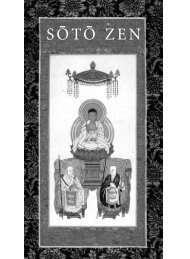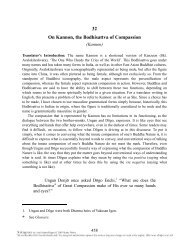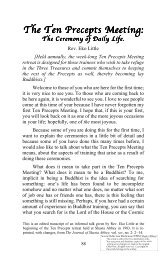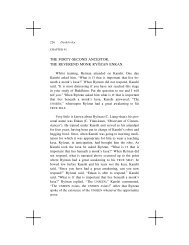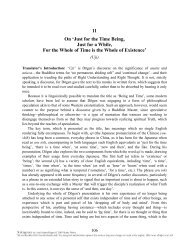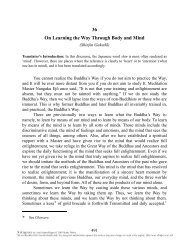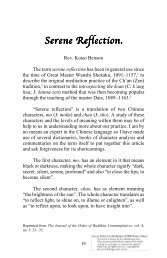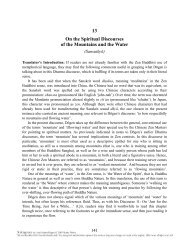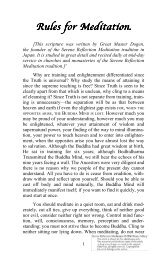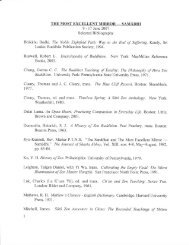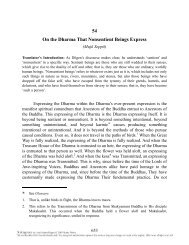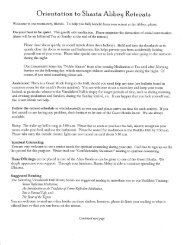Sesshin Sessho - thezensite
Sesshin Sessho - thezensite
Sesshin Sessho - thezensite
Create successful ePaper yourself
Turn your PDF publications into a flip-book with our unique Google optimized e-Paper software.
41<br />
On Expressing One’s True Nature<br />
by Expressing One’s Intent<br />
(<strong>Sesshin</strong> Sesshō)<br />
Translator’s Introduction: This title contains an ambiguity that is lost in translation. The term<br />
sesshin can be rendered either as ‘expressing one’s intent’ or as ‘expressing one’s mind’.<br />
However, Dōgen refers to the phrase ‘expressing one’s mind’ as a misinterpretation, especially if<br />
‘expressing’ is taken to mean ‘talking about’, implying an intellectual discussion about the nature<br />
of mind. Sesshō, ‘expressing one’s intent’, refers specifically to actively expressing one’s<br />
spiritual intention to help all sentient beings reach the Other Shore. This is the way in which<br />
someone expresses his or her True Nature, which Dōgen identifies as one’s Buddha Nature. And<br />
the expression of one’s True Nature takes the form of expressing one’s spiritual intent.<br />
Once when Meditation Master Shinzan Sōmitsu was out on a<br />
walk with Great Master Tōzan Ryokai, the latter pointed to a nearby<br />
temple and said, “Within that temple, there is one who is expressing<br />
his True Nature by expressing his intention.”<br />
Shinzan, his elder brother in the Sangha, asked, “And who is<br />
that one?”<br />
Tōzan replied, “With your asking this one question, my elder<br />
brother in the Sangha, that one has forthwith succeeded in completely<br />
passing away into death.”<br />
His elder brother Shinzan then asked, “Then who is it that is<br />
expressing his intention and expressing his True Nature?”<br />
Tōzan replied, “He has revived from within death.” 1<br />
The statement “To express one’s intention is to express one’s True Nature” is the<br />
foundation of the Buddha’s Way from which Buddha after Buddha and Ancestor<br />
after Ancestor have emerged. Were it not for Their expressing Their True Nature by<br />
expressing Their intent, the wondrous Wheel of the Dharma would never have<br />
turned, the intention to realize Buddhahood would never have arisen, and training<br />
and practice would never have manifested. And the Truth would never have been<br />
1. This dialogue has a deeper meaning which Dōgen will reveal later. In the meantime, this<br />
dialogue can be understood as a reference to the dropping off of the illusory self.<br />
528
Shōbōgenzō: On Expressing One’s True Nature by Expressing One’s Intent 529<br />
realized simultaneously with the great earth and its sentient beings, for there has<br />
never been any sentient being who lacked Buddha Nature. Shakyamuni’s raising of<br />
the flower, His eyes atwinkle, was His way of expressing His intention as an<br />
expression of His True Nature. Makakashō’s face breaking out into a smile was his<br />
way of putting it. Our Second Chinese Ancestor Eka’s respectfully bowing to<br />
Bodhidharma and then standing quietly in his place was his way of putting it. Our<br />
Ancestral Master Bodhidharma’s entering China during the Liang dynasty was his<br />
way, and Daiman Kōnin’s Transmitting the kesa * to Daikan Enō was his way. A<br />
certain Master’s holding up his traveling staff * was his way, and another Master’s<br />
laying down his ceremonial hossu * was his way of expressing his intention as an<br />
expression of his True Nature.<br />
Generally speaking, every single meritorious action of Buddha after Buddha<br />
and Ancestor after Ancestor has been, through and through, Their expressing Their<br />
intention as an expression of Buddha Nature. There are ways of doing this in a<br />
normal, everyday manner, and there are ways of expressing it as ‘the tiles * and<br />
stones of one’s walls and fences’. And thus the principle described as “The arising<br />
of intentions is what gives rise to all the various thoughts and things” fully<br />
emerges, as does the principle described as “The dying away of intentions is the<br />
dying away of all the various thoughts and things.” Nevertheless, one’s intention is<br />
being expressed on such occasions, as is one’s True Nature.<br />
At the same time, run-of-the-mill folks have not penetrated into what<br />
intention means and they have not mastered what True Nature means, therefore<br />
they are in the dark as to what ‘expressing intention’ and ‘expressing True Nature’<br />
really mean. Being ignorant of the profundity of what is being talked about and of<br />
the wonders that are being discussed, they say—and teach—that such things<br />
cannot possibly exist in the Way of the Buddhas and Ancestors. Because they do<br />
not know that ‘expressing mind and expressing nature’ means ‘expressing one’s<br />
intention and expressing one’s True Nature’, they think of it as ‘talking about the<br />
mind and talking about the nature of things’. This is because they have not made an<br />
effort to critically examine whether they have indeed penetrated the Great Way.<br />
A certain monk called Meditation Master Daie Sōkō, 2 once said:<br />
❀<br />
* See Glossary.<br />
2. Daie was in the Rinzai Zen tradition, and is credited with having instituted the practice of<br />
focusing on deliberate penetration into classic kōan stories, rather than keeping to themeless
Shōbōgenzō: On Expressing One’s True Nature by Expressing One’s Intent 530<br />
Folks today are fond of talking about mind and talking about<br />
nature, and because they are fond of talking about profundities and<br />
talking about wonders, they are slow to realize the Way. Since mind<br />
and nature form a duality, once these folks have discarded this duality,<br />
and have forgotten all about the profound and the wondrous as well,<br />
then dualities will no longer arise, and they will experience the Truth<br />
that the Buddha promised them.<br />
These remarks of his show that he was still unaware of the silken thread that binds<br />
the Buddhas and Ancestors together, nor had he comprehended what the lifeline of<br />
the Buddhas and Ancestors is. 3 Accordingly, he only understood ‘mind’ to refer to<br />
discriminative thinking and consciousness, so he spoke this way because he had<br />
not learned that the various functions, such as discriminative thinking and<br />
consciousness, are what the intellective mind is. He wrongly viewed ‘nature’ to<br />
mean something that is abundantly clear and peacefully inactive, and did not<br />
understand whether Buddha Nature and the nature of all thoughts and things<br />
existed or did not exist. And because he had not seen his True Nature as It is, not<br />
even in his dreams, he had a false view of what Buddha Dharma is. The ‘mind’ that<br />
the Buddhas and Ancestors spoke of is the very Skin and Flesh, Bones and<br />
Marrow. And the ‘nature’ that the Buddhas and Ancestors have preserved is a<br />
monk’s traveling staff and the shaft of a bamboo arrow. 4 The Buddhas and<br />
Ancestors have profoundly realized the Buddhahood promised Them by the<br />
Buddha, and this is what is meant by being a pillar * of the temple or a stone<br />
lantern. * How wondrous it is that the Buddhas and Ancestors hold up and offer to<br />
us Their wise discernment and understanding!<br />
From the first, the Buddhas and Ancestors who are really Buddhas and<br />
Ancestors have always learned that this ‘mind’ and this ‘nature’ refer to ‘intention’<br />
and ‘Buddha Nature’, and have given expression to them, and have put them into<br />
practice, and have awakened to them. They have preserved and kept to this<br />
profound and wondrous Teaching, exploring It through their training with their<br />
Master. We call those who are like this the Buddha’s descendents who are truly<br />
meditation. Dōgen, in a rare criticism of specific monks, held Daie responsible for what he<br />
considered a perversion and betrayal of the pre-Daie Rinzai tradition.<br />
3. The particular silken thread that is mentioned here was used to bind Scriptural texts together<br />
and, as a metaphor, refers to the ‘thread of Transmission’ that runs through, and binds<br />
together, the Buddhas and Ancestors.<br />
4. A monk’s traveling staff and the shaft of a bamboo arrow are common metaphors for what a<br />
Zen Master uses to point a disciple to the truth.
Shōbōgenzō: On Expressing One’s True Nature by Expressing One’s Intent 531<br />
studying the Buddhas and Ancestors. Those who are not like this are not really<br />
studying the Way.<br />
Thus, Daie, your ‘attaining the Way’ does not attain the Way, and when it is<br />
time to go beyond attaining the Way, you are unable to do so. You stumble your<br />
way through both the times of attaining and the times of going beyond attaining.<br />
As you would have it, Daie, since mind and nature form a duality, we ought to<br />
discard them. This is your little attempt to explain ‘mind’, an effort that can only<br />
explain one-hundred-thousand-millionth of it! To say that the profound and the<br />
wondrous are both to be discarded is but one small aspect of it, and yet it is the<br />
only aspect that you bring up for discussion when talking about them. Without<br />
learning what the key point to all of this is, you foolishly speak of forgetting all<br />
about them, having considered them to be things that have left your own hands and<br />
departed from your own being. You have not yet discarded the narrow views of the<br />
Lesser Course, * so how could you possibly penetrate the inner depths of the<br />
Greater Course, * to say nothing about understanding the key point of what is above<br />
and beyond Buddhahood! It is difficult to say that you have ever tasted the tea and<br />
rice of the Buddhas and Ancestors.<br />
Simply, to earnestly explore this Matter * under a Master is to thoroughly<br />
experience, at this very moment of our existence, the expressing of our intention as<br />
the expression of our True Nature. This is how it was in the past and will be in the<br />
future. We should thoroughly explore this Matter for ourselves, since there is<br />
nothing that stands second or third to this. 5<br />
❀<br />
There was that time when our First Chinese Ancestor<br />
Bodhidharma gave instruction to his disciple Eka, saying, “If you<br />
simply bring to a halt all entanglements with things outside yourself<br />
and do not let your mind pant after things, then, with your very mind<br />
that is like walls and fences, you will thereby be able to enter the<br />
Way.”<br />
Eka tried in various ways to express his intention as well as his True Nature, but he<br />
did not succeed in realizing the Buddhahood that the Buddha had promised. Then,<br />
one day, he suddenly realized the Truth.<br />
As a result, he said to our First Ancestor, “This time, for the<br />
first time, your disciple has brought his entanglements to a halt.”<br />
5. That is, it is unique and not simply one thing among many.
Shōbōgenzō: On Expressing One’s True Nature by Expressing One’s Intent 532<br />
Our First Ancestor, already knowing what Eka had become aware of, did not probe<br />
further into the nature of his disciple’s experience.<br />
He simply asked him, “You haven’t realized total cessation of<br />
these entanglements, have you?”<br />
Eka replied, “No.”<br />
The First Ancestor then asked, “What is it like, then, for you?”<br />
Eka replied, “As I am constantly recognizing It, I realize that<br />
words do not come near It.”<br />
The First Ancestor then remarked, “That is precisely the<br />
substance of Mind which has been Transmitted by all the Buddhas<br />
and all the Ancestors of the past. Since you now have It, you yourself<br />
must guard It well.”<br />
There are those who have doubts about this story, and there are those who<br />
take it up and expound upon it. Well, this is just one story among a number of<br />
stories on how Eka trained under Bodhidharma and served him. Eka repeatedly<br />
tried expressing his intent and his True Nature. At first he did not succeed in<br />
realizing what the Buddha had promised, but, little by little, he accumulated merits<br />
and piled up virtues until he finally realized the Way that our First Ancestor had<br />
spoken of. Those who are slow of wit have considered this to mean, “When Eka<br />
first attempted to express his intention and his True Nature, he had not yet<br />
awakened to what the Buddha had promised. The fault lay in his trying to express<br />
his intention and his True Nature, but later he let go of ‘expressing my intention<br />
and expressing my True Nature’, and thereby realized what the Buddha had<br />
promised.” 6 They are speaking in this way because they have not yet penetrated<br />
the saying, “With your very mind that is like walls and fences, you will thereby be<br />
able to enter the Way.” They are especially in the dark about how to go about<br />
studying the Way. And, should you ask why this is so, well, from the time when<br />
you first give rise to the intention to spiritually awaken and incline your steps<br />
towards training and practice of the Buddha’s Way, you will be heartily putting into<br />
practice a difficult course of training. And, though you put it into practice, you may<br />
not hit the bull’s-eye even once in a hundred tries. Even so, you will ultimately hit<br />
the target, sometimes by following the advice of your spiritual friend and<br />
sometimes by following Scriptural texts. The one hit today is due to the strength of<br />
a hundred misses in the past. It is the fulfillment of those hundred misses. Your<br />
listening to what is taught, training in the Way, and awakening to the Truth—none<br />
6. That is, they viewed Eka as treating his intention and his True Nature as a duality, whereas<br />
they are really two aspects of the same thing.
Shōbōgenzō: On Expressing One’s True Nature by Expressing One’s Intent 533<br />
of these are any different from this. Although yesterday’s efforts to express your<br />
intention and your True Nature were equivalent to a hundred misses, yesterday’s<br />
hundred misses become today’s suddenly hitting the bull’s-eye. When you first<br />
begin to practice the Buddha’s Way, it may be said that you have not yet<br />
thoroughly penetrated the Truth due to lingering attachments. You cannot attain the<br />
Buddha’s Way by abandoning It in favor of other ways. Folks who have not yet<br />
penetrated the training and practice of the Buddha’s Way from start to finish find it<br />
difficult to clarify what this principle of penetration is.<br />
The Buddha’s Way is the Buddha’s Way even when one first gives rise to the<br />
intention to train, and It is the Buddha’s Way even when one fully realizes the<br />
Truth: It is the Buddha’s Way—beginning, middle, and end. It is comparable to<br />
someone’s walking for thousands of miles. When walking ten thousand miles, all<br />
that one can do is to take one step at a time, and within ten thousand miles are tens<br />
of thousands of steps. Even though the first step and the ten-thousandth step are<br />
different, all of it is still simply the act of walking ten thousand miles. At the same<br />
time, folks who have reached the height of folly believe that during the time when<br />
one is studying the Buddha’s Way, one has not yet reached the Buddha’s Way, for<br />
only when one has gone beyond Buddhahood is It really the Buddha’s Way. They<br />
are like this because they do not know that the whole Way is our expressing the<br />
Way, that the whole Way is our practicing the Way, and that the whole Way is our<br />
realizing the Way. Those folks talk the way they do because they have been taught<br />
that only deluded people experience the great realization through their training and<br />
practice of the Buddha’s Way. As a result, they do not realize that non-deluded<br />
people also experience the great realization through their training and practice of<br />
the Buddha’s Way.<br />
Even before we have realized what the Buddha promised, expressing our<br />
Buddha Nature by expressing our intent is already the Way of Buddhas. At the<br />
same time, it is through our expressing our True Nature by expressing our intent<br />
that we realize what the Buddha promised. We must not explore through our<br />
training that ‘realizing what the Buddha promised’ is restricted to the first great<br />
realization of a deluded person. The deluded have their great realization, and the<br />
enlightened have their great realization, and the unenlightened have their great<br />
realization, and the undeluded have their great realization, and all those who have<br />
realized what the Buddha promised have actually realized what the Buddha<br />
promised.<br />
Consequently, expressing one’s intention as an expression of one’s True<br />
Nature is being straight and true within the Buddha’s Way. Not having thoroughly<br />
comprehended this principle, Daie advises us that we should express neither our<br />
intention nor our True Nature, but this is not a principle of the Buddha Dharma.
Shōbōgenzō: On Expressing One’s True Nature by Expressing One’s Intent 534<br />
And, alas, things are so bad today in Great Sung China that there is no one who can<br />
even come up to gentleman Daie’s low level of understanding.<br />
❀<br />
Our Founding Ancestor, Great Master Tōzan Ryokai, who was uniquely<br />
venerated among our Ancestors, had thoroughly penetrated the principle that<br />
‘expressing one’s mind’ and ‘expressing one’s nature’ are comparable, on a deeper<br />
level, to expressing one’s intention as an expression of one’s True Nature. An<br />
Ancestral Master who has not thoroughly penetrated this principle cannot have an<br />
expression comparable to the one Tōzan made in the account I told at the<br />
beginning of this discourse.<br />
Once when Meditation Master Shinzan Sōmitsu was out on a<br />
walk with Great Master Tōzan Ryokai, the latter pointed to a nearby<br />
temple and said, “Within that temple, there is One who is expressing<br />
His True Nature by expressing His intention.” 7<br />
From the time when our Founding Ancestor set up his temple, his Dharma<br />
descendants have, without exception, correctly Transmitted our Ancestral tradition.<br />
It is something that those in other traditions have not even dreamed of. How much<br />
less could they know, even in a dream, how to understand it! Only his authentic<br />
heirs have correctly Transmitted it. Had they not correctly Transmitted this<br />
principle, how could anyone penetrate to what is fundamental in the Buddha’s<br />
Way? The principle that we are now talking about, whether we plumb its depths or<br />
merely scratch its surface, is that of some human being expressing his or her intent<br />
and True Nature. The mind expressing itself, both on the outer surface and deeply<br />
within, is the True Nature expressing Itself both on the outer surface and deeply<br />
within. You need to do your utmost to thoroughly explore this. There is no<br />
expression that lacks True Nature, and there is no intention that lacks an<br />
expression.<br />
What we call ‘Buddha Nature’ means that all things are expressing It, and<br />
what we call ‘lacking a Buddha Nature’ also means that all things are expressing It.<br />
Though we may explore through our training that Buddha Nature is what is meant<br />
by ‘nature’, if we should fail to explore through our training that we have Buddha<br />
Nature, it would not be the way to study the Way. And if we should fail to explore<br />
through our training that we lack a Buddha Nature, it would also not be the way to<br />
7. This change in rendering the dialogue that Dōgen presented in the opening of this discourse<br />
presents a deeper, spiritual meaning behind this exchange.
Shōbōgenzō: On Expressing One’s True Nature by Expressing One’s Intent 535<br />
explore the Matter through our training. 8 When we explore the Teaching that<br />
expressing our intention through our training is synonymous with our True Nature,<br />
we become a Dharma heir of an Ancestor of the Buddha; when we trust that our<br />
True Nature is expressing Itself, we become an Ancestor of the Buddha for our<br />
Dharma heirs.<br />
To state that “One’s mind is ever restless, whereas one’s nature is steady” is<br />
an assertion of non-Buddhists. To state that “The innate nature of things is<br />
profoundly clear, whereas their forms are ever shifting” is also an assertion of non-<br />
Buddhists. The way that Buddhists study ‘mind’ and ‘nature’ is not the way those<br />
folks study it. The way that Buddhists put their intentions into practice so as to put<br />
their Nature into practice is in no way like the behavior of non-Buddhists. The way<br />
that Buddhists clarify what Mind and Nature are finds no equivalent in what non-<br />
Buddhists teach.<br />
In the Buddha’s Way, there is an expression of intention that is personal and<br />
an expression of True Nature that is also personal, and there is an expression of<br />
both of them that goes beyond the personal. Also, there is a way of not expressing<br />
them that is personal, and there is a way of not expressing them that goes beyond<br />
the personal. When we have not yet studied the expressing of intention that goes<br />
beyond the personal, then this will be an expressing of intention which has not yet<br />
reached fertile ground. When we have not yet studied the expressing of intention<br />
that is personal, this too will be an expressing of intention that has not yet reached<br />
fertile ground. We study the expressing of intent that goes beyond any person, we<br />
study That which goes beyond the personal in expressing Its intent, we study a<br />
personal expressing of intention, and we study that there is someone who expresses<br />
his intention.<br />
The strongest way that Rinzai phrased it was merely as ‘a real person who is<br />
beyond rank’; he still had not phrased it as ‘a real person who has a rank’. He had<br />
not yet displayed any other ways of exploring this through his training or any other<br />
ways of putting it. Thus, we must say that he had not yet reached the field of the<br />
Ultimate. Because expressing one’s intention and expressing one’s Nature is<br />
synonymous with expressing Buddha and expressing Ancestor, we and our Master<br />
may encounter each other through hearing, and we may encounter each other<br />
through seeing.<br />
Shinzan, Tōzan’s elder brother in the Sangha, said, “And It is<br />
Who.”<br />
8. The meaning of ‘lacking a Buddha Nature’ is thoroughly explored by Dōgen in his<br />
Discourse 21: On Buddha Nature (Busshō).
Shōbōgenzō: On Expressing One’s True Nature by Expressing One’s Intent 536<br />
Elder brother Shinzan, in letting this way of expressing It emerge, could have put it<br />
this way earlier and he could put it this way later as well. ‘It is Who’ is his<br />
expressing his intention and his Buddha Nature right there at that moment. 9<br />
Accordingly, at the time when it is put as “Who is It?” and at the time when it is<br />
put as “It is Who,” this will be Its expressing Its intention and Its expressing Its<br />
True Nature. This expressing of Its intention and of Its True Nature is something<br />
that folks throughout the ten quarters have never known. Because they have lost<br />
sight of their Child and take It to be a thief, they likewise judge a thief to be their<br />
child.<br />
Tōzan replied, “With your asking this one question, my elder<br />
brother in the Sangha, that One has forthwith succeeded in completely<br />
passing away into death.”<br />
Many who are middling in their training, upon hearing these words, think,<br />
“Someone who is expressing his mind and expressing his nature is saying, ‘Who is<br />
it?’ and must be able forthwith to completely pass away into death.” As a<br />
consequence, they are not conscious of its other meaning—‘it is Who’—and never<br />
succeed in having an encounter with a Master, so it must be for them a dead and<br />
meaningless phrase. It isn’t necessarily dead and meaningless. Those who have<br />
penetrated what this ‘expressing True Nature by expressing intent’ means must<br />
surely be few. To completely pass into death does not mean just being ten or<br />
twenty percent dead, for it means passing into death one hundred percent. 10 At that<br />
very moment, who can say that this is not some limiting of the heavens and some<br />
covering up of the earth? It will be our letting go of trying to shed light upon our<br />
past, our present, our future, and, indeed, it will be our letting go of trying to shed<br />
light upon this very moment of now.<br />
His elder brother Shinzan then said, “And It is Who that<br />
expresses His intention and expresses His True Nature.”<br />
Although the name referred to by the previous “Who is it?” and the present “And It<br />
is Who” is a veritable ‘third son of a Mr. Chang’, the One being referred to is<br />
actually ‘the fourth son of a Mr. Lee’. 11<br />
9. Shinzan’s response can be taken both as a question and as an answer: “Who is It that resides<br />
within?” and “It is Who (one’s Buddha Nature) that resides within.”<br />
10. ‘Passing into death one hundred percent’ refers to completely and absolutely letting go of<br />
the false self.<br />
11. That is, in both cases these two phrases seem to be exactly the same, but they are actually<br />
completely different in meaning.
Shōbōgenzō: On Expressing One’s True Nature by Expressing One’s Intent 537<br />
Tōzan replied, “He has revived from within death.” 12<br />
This phrase, ‘within death,’ points to having been able to pass directly into<br />
death. And Shinzan’s saying “It is Who,” which was not a casual remark, points<br />
directly to the condition of expressing his Nature by expressing his intent. This<br />
‘Who’ directs the person who is expressing His intention and expressing His True<br />
Nature. Something to explore through your training is the assertion that we do not<br />
necessarily anticipate a one hundred percent passing away into death. The Great<br />
Master’s statement, “He has revived from within death,” refers to the manifesting<br />
of sounds and forms before one’s very eyes, which expresses both intent and True<br />
Nature. And yet, even this will only be some ten or twenty percent of the entirety<br />
of passing away into death. Life, even though it is the totality of life, is not<br />
something wherein death is transformed and manifests as life. It is simply our<br />
letting go, from start to finish, of the notion of our ‘possessing’ life.<br />
In sum, in the words and ways of the Buddhas and Ancestors, there is an<br />
expressing of one’s intent and of one’s True Nature like that described above,<br />
which is to be thoroughly explored through one’s training. And to take this further,<br />
when we die a one hundred percent death, we have lived our life to the full.<br />
You need to realize that from the T’ang dynasty to today, there have been<br />
many pitiable creatures who have not clarified that expressing intention and<br />
expressing one’s True Nature is what the Buddha’s Way is about. Further, they<br />
have been going around in the dark about the Teachings, practice, and direct<br />
experience, and have therefore made reckless remarks and unfounded assertions.<br />
We need to help them overcome what they have been and to realize what they can<br />
be. For their sake, we say that expressing Their True Nature by expressing Their<br />
intent has been the essential function of the Seven Buddhas * along with our<br />
ancestral Masters.<br />
Delivered to the assembly in the first year of the Kangen era (1243) in Japan, at Kippō-ji Temple<br />
in the Yoshida Prefecture of Echizen Province.<br />
Copied by me on the eleventh day of the first lunar month in the second year of the same era<br />
(February 20, 1244) while at the office of the Abbot’s assistant.<br />
Ejō<br />
12. Whereas Dōgen begins by discussing this dialogue from the standpoint of the dropping off<br />
of self, he now discusses it from the point of view of dropping off ‘dropping off ’. In other<br />
words, since the concept of self is an illusion, there is nothing to be dropped off. However,<br />
we cannot know this until the time when the false ego has been let go of. At that time, we<br />
discover that ‘That Which Is’ is the One who has actually done the dropping off, for It has<br />
ever been the only true reality.



